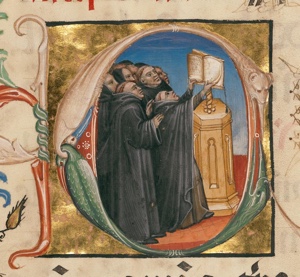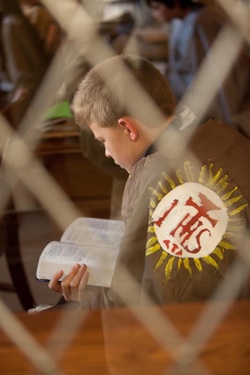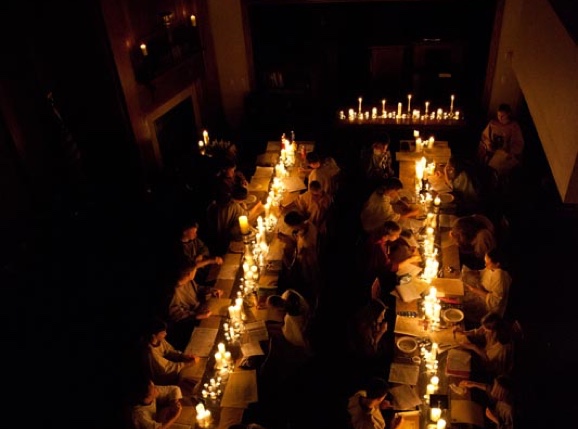Winter 2016
TWO DAYS A MONK

Initial C: Monks Singing; Unknown; Northeastern Italy, Italy; about 1420; Tempera colors, gold leaf, and ink on parchment; Leaf: 46.5 x 34.6 cm (18 5/16 x 13 5/8 in.); Ms. 24, leaf 3v
The medieval mindset, largely lost and almost entirely dismissed by our worldview today, forms much of the foundation of classical education.
Each year, students at The Ambrose School experience medieval monasticism in a real way at the Monastic Conventiculum (MonCon). After studying monasticism, they spend from Friday afternoon to Saturday morning at school. But not ordinary school.
Arriving on a Friday evening, they don their robes (pre-prepared by volunteers out of bedsheets) take a vow, and enter the transformed monastery. They are not allowed to speak (much). A cell phone is punishable by excommunication, if only from the event. They eat simple food and follow a monastic schedule of services (liturgies), sleep, scribing, and personal devotions.

Heather Kozup, Kozup Photography
This is just one example of the ways classical education teaches the heart, trains the affections, and educates the soul. Classical schools around the country do this in various ways every day, not all as solemn or lengthy as an entire night and day. But effective, nonetheless. These goals are contained in those little habits ingrained throughout the days and months—those extra projects, the house systems, the overnight retreats.
In the words of the teacher who created MonCon, here is why it matters.
I have seen things like this hundreds of times—it’s the joy of teaching really—but it never ceases to astonish me and bring me to my knees with gratitude and awe that when we “do school” or “do academics” in this way—through an experience that is embodied, beautiful and real, and not merely a “reenactment” (let alone a lecture, reading, or other type of traditional lesson)—13- and 14-year-old boys and girls (who initially whined that we were not allow-ing them to bring technology to this event) not only actually learn the “facts” and “ideas” of history, literature,and philosophy better, their loves are truly shaped: these students came away from the week not only understanding monasticism better, but loving prayer, poetry, meditation, liturgy, silence, loving Jesus more. This is one tangible instance of how academics and discipleship must be inextricably intertwined—the beauty of academic truth not only filling minds but pulling hearts toward goodness.
Here is what I saw. An unusually active student spending every free moment of MonCon in the chapel with his Bible, or on his knees, or head bowed in prayer. Other students volitionally choosing to do the same—and I had the opportunity to pray for them as golden sunset-light filled the “chapel.” Their silence, tears, soft hearts, open Bibles. The light of 300+ (see cover photo) candles making our school a place of hallowed beauty—and the students’ visceral responses to this beauty.
Beauty, peace, stillness, silence, prayer, liturgy, community, discipline, the presence of the Holy Spirit—over and over again— these are the words the students are using to describe their academic experience of learning about medieval monasticism.
And this is why you might want to think even more deeply about how you can help and support your school and teachers as they seek to educate deeply. ![]()










